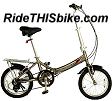|

Folding
Bikes | Places
To Ride | Reviews
| Sitemap
Cycling news & info with a special focus
on notable bike tours, bike trails, bikeways,
lanes and bicycle routes as well as innovative
bicycling products like space saving & easy
to transport folding bikes.
|
Mass Transit + Folding Bikes
Combining Use Of A Folding Bike With Mass Transitby Larry Lagarde Bicycles can be a great means of transportation; however, getting to some places by bicycle alone can be quite difficult. In such cases, a multi-modal approach using mass transit as a bridge can be an excellent solution. Recently, I met with the general manager and key staff at the New Orleans Regional Transit Authority ( NORTA) about bringing folding bikes aboard their buses and streetcars. Like many mass transit authorities, NORTA has bike racks on the front of their buses; however, those bike racks only accommodate a total of 2 bikes per bus. Moreover, NORTA's iconic electric trolleys (streetcars) don't even have bike racks... To demonstrate how NORTA could accommodate more cyclists with bicycles, I brought 3 folding bike models to the meeting - a CarryMe DS, a Strida 5.0 and a Kent Compact Nexus 3. I showed that folding bikes can fold so compactly that they can take up nominal space inside any mass transit vehicle. As with most instances when I show someone a folding bike for the first time, it was great fun watching their looks of amazement as I demonstrated folding, unfolding and rolling the bikes along when folded ( CarryMe and Strida). More importantly though, 3 advantages of folding bikes appealed to them. First, the folded bikes each fit into carrybags that shielded transit riders, other transit users, etc. from the sharp edges that an unbagged bike would present. Second, folding bikes can be carried in their transit vehicles now with no need for purchasing special equipment to do so. Lastly, folding bikes make mass transit more appealing because more riders can get to transit stops and into the transit cars faster on a bike that folds. As a result of our meeting, NORTA appears close to issuing a written policy about riders carrying folding bikes on the transit buses and streetcars. My gut feeling is that they'll want the folding bikes to be bagged before going onboard. Though that may be a little inconvenient, at least cyclists will know in advance what's needed to take their folding bikes with them when using NORTA. Labels: folding bikes on mass transit, mass transit
Folding Bikes & Mass Transit
A Sensible, Integrated Transportation Solution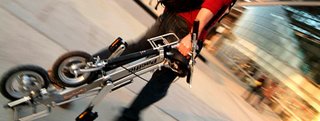 By Larry Lagarde Would commuting via folding bike and mass transit be appealing? Commuter Ellen Babcock thinks so. She has no regrets about giving up commuting via her pickup for a multi-modal commute via folding bike and transit. Reading Ellen's story, I wondered whether the same logic could be applied to even the most car centric metropolis. To get an answer, I contacted the Los Angeles Metropolitan Transit Authority (MTA) and learned that they're working on a plan to encourage using fold up bikes with the Metro. According to an interview I conducted with MTA's Dave Sotero and Lynn Goldsmith, Caltrans recently awarded $85,000 to the Los Angeles County Metropolitan Transportation Authority to prepare a program to get more cyclists and motor vehicle drivers to ride L. A.'s Metro. How? By offering an incentive for using a folding bike in combination with the Metro. MTA officials view folding bikes as a partial answer to 2 tough problems facing transit agencies worldwide: how to get more commuters to use mass transit and how to accommodate additional transit users. Like most transit agencies, Metro barely has enough funds to make ends meet. If they can convince more commuters to adopt folding bikes, transit administrators can improve infrastructure (as in buy more buses and subway coaches as well as build more Park and Ride facilities) in a sensible and affordable manner. To fund the folding bike incentive program, Metro is studing similar projects like Santa Cruz's Folding Bikes in Buses program. The Santa Cruz program offsets the cost of acquiring a folding bike to use with the buses. A pollution mitigation grant from the Monterey Bay Unified Air Pollution Control District funds the Santa Cruz program. 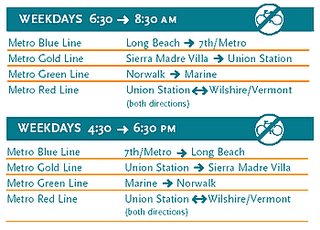 Although folding bike users can board MTA trains & buses at any time, restrictions exist for full size bikes and this has caused friction. In June, L.A. City Council President Eric Garcetti pushed for the MTA to drop the rush hour ban on full size bikes and even suggested that seats be pulled from Metro trains to provide more space for bicycles. Naturally, this did not sit well with non-cycling Metro users. Although folding bikes are not for everyone, their versatility makes it more practical for more people to use mass transit. Riding a bike right up to the transit stop, folding the bike and rolling it aboard often takes less time than driving and parking at a transit station. Keeping your 'last mile' transportation (folding bike) by your side also alleviates the worry of leaving your vehicle unattended at the station all day. Although the MTA has funding to study a folding bike incentive program, funding the folding bike incentives is another matter. Nevertheless, Metro authorities hope to begin offering incentives to encourage more commuters to use folding bikes in a year or so. By the way, Dave Sotero commutes regularly via the MTA + folding bike and has found that folding bikes easily fit in a variety of places on all of the MTA buses and trains. In fact, all credit for the photos displayed in the following slideshow (showing folding bikes traveling on the Metro) goes to Dave. Labels: folding bikes on mass transit, LA-Metro, LA-MTA, mass transit
Re-emergence of Cycling & Urban Living
by Larry Lagarde Recently, an American living in Holland sent me this photo of bike parking at a local commuter railway station in Amsterdam along with the following text: 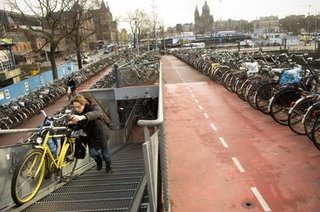 I thought you might find this interesting. Holland is heaven for cycle lovers. The latest figures show that there's over 20,000 kilometers of bike paths in The Netherlands (that's over 12,000 miles for you non-metric people). I thought you might find this interesting. Holland is heaven for cycle lovers. The latest figures show that there's over 20,000 kilometers of bike paths in The Netherlands (that's over 12,000 miles for you non-metric people).
Here's a picture of bicycles parked in ONE of the bicycle parking locations at the Amsterdam train station. Notice that the bicycles are on both sides and also behind the escalator and go all the way to the back by the trees. Also notice how the escalator has a groove for the bicycle wheels so that you can get the bike up and down the stairs (regular stairways have this too).
A lot of train stations also have an elevator not just for handicap access but also for older individuals with bicycles that find it hard to hold the bike steady while riding the escalator. There are areas designated on trains so cyclists can sit with their bicycles or for cyclists to place their bikes while traveling so crating/boxing a bike is not required.
As an American, when I first moved here 14 years ago, it was funny to see all the cycles everywhere but I'm getting used to it. It's still fascinating how many people commute daily with their bicycles. It took some getting used before it became normal to see men in suits and briefcases bicycling or women in their good clothes bicycling.
Everything here seems to revolve around cycling. Although I'd driven an automatic transmission for almost 20 years in the States, I was required to take lessons here in order to get my Dutch drivers license. One of the most difficult things to adapt to is the constant looking over your shoulder and out the side window to see if there are any cyclists. Drivers Education here stresses looking at all angles of the car, front, sides and back, checking the rear view mirror every 3 seconds to see what's behind you and the side mirrors every 5 seconds. You can hear another car but not a lone bicyclist; thus, given the number of people who bicycle in The Netherlands, driving lessons and the exam revolve around paying attention to your surroundings.
Cecelia
Will the popularity of cycling ever reach the point in the USA when there are multi-story cycling garages in most major American cities? Probably but not just yet. More than likely, most people will continue to hold out hope that the current crisis will pass and gas prices will go down; however, lower prices are not probable. Instead, due to economic growth in emerging nations like China & India, world demand for oil will continue to rise regardless of falling demand in industrial nations. Meanwhile, world oil production will slowly fall, causing oil prices to continue their upward creep. Instability anywhere in the oil supply chain will only add to the price increases... America is at a crossroads. The sooner we face facts, the faster we can adjust and profit from the realities of the new economy. Americans are about to re-discover local scale economics and inner urban living. What will be hot in this economy? Living within walking, biking & mass transit distance of the essentials: work, shopping, schools & church. Vacationing closer to home. Living more efficiently. Shopping online. What will be out? Suburbia. Demand for housing in town will rise while demand falls in outlying areas. My advice is that we the people demand action now. We must tell our elected representatives to invest in alternative energy and transportation solutions NOW. Due to decades of chronic under funding, "mass transit" is so inefficient in so many places that only the most marginalized tend to use it. Naturally, there are exceptions but most people don't live in places with great mass transit. Folding bikes will help some commuters adopt to transit but huge investments in transit infrastructure are needed and transit agencies do not have the budgets to do this. Only when the federal government opens the tap will transit authorities be able to rebuild and that's years away from happening. Labels: folding bikes on mass transit, mass transit, peak-oil
How To Grow Mass Transit In A Car Centric Society
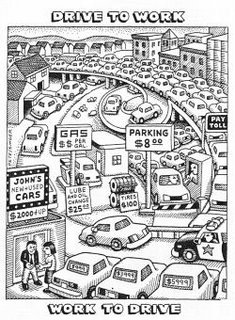 by Larry Lagarde In all the world's great cities, public transportation or mass transit is viewed as essential to the well being of the metropolis; yet, in many North American communities, mass transit is struggling. Case in point: Allegheny County's Port Authority. (Graphic: Drive to work; work to drive.) For years, the Port Authority (P.A.) has struggled with financial challenges. Created by the Pennsylvania General Assembly in 1956 to plan and develop Pittsburgh, Pennsylvania's port facilities, the P.A. grew to be responsible for all bus service and commuter light rail serving the region. As suburbia grew, the P.A. added routes and traveled further to meet the demand. Due to insufficient governmental subsidies, the P.A.'s struggle to remain solvent has lead to a slow increase in fares and cut backs in service. 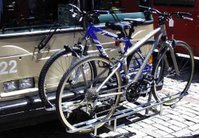 The Port Authority's plan to cut services & raise fares is the result of a century of car culture blinding us to the obvious. We all know that oil supplies are dwindling, pollution is triggering global climate change and traffic congestion creates road rage; yet, we continue to drive our cars. Why? Because in our emotion driven psyches, cars symbolize mobility, mobility means freedom & freedom means bliss. (Photo: Bikes add freedom to mass transit.) President Bush once said we were addicted to oil. In truth, we Americans are addicted to our cars. Like changing any ingrained habit, breaking ourselves of driving everywhere will be painful. Until mass transit becomes more appealing, people will continue to rely upon their personal motor vehicles. To be appealing, mass transit must be reliable, affordable, safe, frequent and available throughout our metro areas. Using a bike that folds makes mass transit feasible to more users by making transit stops more accessible from greater distances. Because they fold, riders can take their folding bikes onto the bus, subway, etc. As more people discover the advantages of folding bikes, use of mass transit will rise; however, more must be done to make mass transit attractive to a wider base of users. My thanks go to Ed Heath for drawing attention to Pittsburgh's transportation issues via his blog, Cognitive Dissonance. Labels: Cognitive Dissonance, folding bikes, mass transit, Pennsylvania, Pittsburgh, public transportation
Living Car Free In Los Angeles
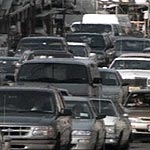 Did you know that in Los Angeles, the average time a driver spends in traffic totals a ridiculous two and a half weeks per year? Glen Janken is a 55 year old native of Los Angeles that's had it with L.A.'s notorious traffic. He's resolved to use alternate transportation like buses and bikes to get around. Yesterday, Glen wrote about a recent shopping excursion. He rode his bike 30 miles to the store then rode the bus back, placing the bicycle on the bike rack on the front of the bus. The most interesting point concerning Glen's journey is that his return journey by bus took as long as the bike ride to the store. Glen believes that the lack of stop signs or traffic signals on the bike trail combined with the bus having to go through traffic is why the travel times were the same. Following are some useful sites for living without a car in Los Angeles: Glen Janken's car free L.A. lifestyle blog... fixlatraffic.blogspot.comCarFreeLA.com offers a variety of articles about living in Los Angeles without a car. The LADOT offers info on bikeways and local transit services. Labels: bike trails, bikeways, car free living, Los Angeles, mass transit, multi modal, transportation
Washington DC Mass Transit Guidelines For Bikes
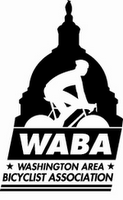 There was a post this evening on the Washington Area Bicyclist Association weblog about taking bikes on the various transit bus, train and light rail systems in the D.C. area. Happily, it was reported that all D.C. area mass transit operators allow folding bikes aboard (though some require folders to be bagged). Unfortunately, the news is not so good for riders of standard sized bikes. For the complete details including links to the various transit agencies' info on carrying bicycles, visit... http://washcycle.typepad.comRespectfully, Larry Lagarde RideTHISbike.comUrging bicycling for recreation, commuting, health and a better future. Labels: Bike Friday, bike guidelines, bike regulations, folding bicycle, mass transit, transportation, waba, washington area bicyclist association
Folding
Bikes | Places
To Ride | Reviews
| Sitemap
RideTHISbike.com
Cycling
for fun, fitness & practicality.
PO Box 9025,
Bridge City, LA. 70094
Ph: 504-324-2492
Email
Us
© 2005-2010 Areafocus.com.
All rights reserved.
Website Terms & Conditions
|
|






